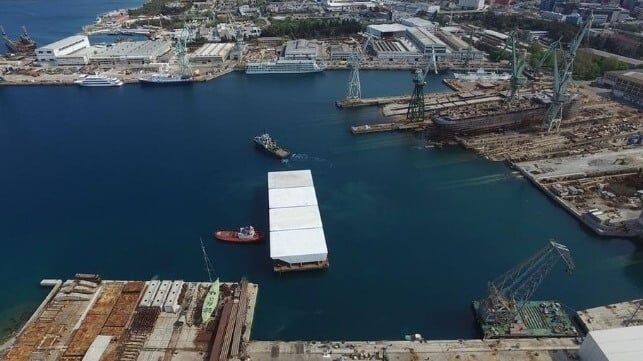Brodosplit in Financial Crisis After Losing Russian Construction Loans

Brodosplit the Croatian shipbuilder has filed for provisional bankruptcy as the company looks for a solution to a financial crisis brought on by the EU's financial and banking sanctions against Russian institutions. The largest industrial employer in Croatia, the shipyard and its parent company DIV Group explain that it is not an operational problem but instead a loss of construction financing and an inability to complete a financial bridge solution with the government.
The problem began for Brodosplit early in April as the EU moved to tighten the financial sanctions on Russia and included VTB, a Russian bank and lending network, majority state-owned, in the restrictions. Brodosplit is building two commercial projects for which it required €150 million ($159 million). DIV committed to supplying €30 million and the shipyard took loans from VTB for a total of €120 million. As of March, the shipyard has drawn €82 million from the Russians when the loans were blocked as part of the sanctions. The restrictions imposed on VTB due to the war in Ukraine prevented the payment of the remaining €38 million.
Initially, DIV stepped in to provide additional financial support but they turned to the government proposing a bridge loan to the shipyard to finance the completion of the two ships. DIV says it also became financially overextended supporting the shipyard. Brodosplit reports that work on one of the two projects is nearly finished and they estimate it could be completed with an additional €500,000, while the second project requires approximately €8 million to complete the ship due for delivery at the end of the year.
DIV reports that it has been in intensive talks with the Croatian Bank for Reconstruction and Development (HBOR) to secure a loan for Brodosplit, but that it has not received a response from the government to its proposal. It emphasizes that it is not asking for a subsidy, but instead a loan.
“I hope they didn't give up on us,” a director of Brodosplit told Croatian media over the weekend. “We will survive with or without the government,” he said while saying that the company however would be “crippled,” without the government loan. He emphasized that some workers have not been paid in weeks and while there had been promises of assistance from the Agency for the Protection of Workers, nothing had been received. About 600 employees were continuing as of last week to work at the shipyard, mostly on coastal patrol boats for the Ministry of Defense and another new building, but most of the 1,500 employees have been furloughed since production ceased in April.
There had been a rumor that a solution had been found with the government, but last week the finance minister said that the situation was still being analyzed for the technical, legal, and financial implications of guarantying the shipyard’s request. The shipyard notes that it was profitable in 2021, but that its financial situation is complicated by EU restrictions. The yard was privatized by the government to meet EU restrictions when the country entered the EU in 2013 and the government is now unsure as to the level or form of support it is permitted to provide.

that matters most
Get the latest maritime news delivered to your inbox daily.
In April, suppliers to the company that had not been paid asked the court about the terms of filing a bankruptcy claim. The shipyard and its parent company however filed a pre-bankruptcy petition seeking to delay any actions by the creditors as they cited claims against Croatia and the ongoing discussions with the government. Last week the company was forced to refile due to an omission on the first filing while the minister said the court filing was complicating an already complex situation.
Brodosplit is not the only maritime company that found itself caught in the impact of the sanctions. In Norway, Havila Kystruten had arranged to lease its cruise ships from the Russian finance company GTLK, which was also included in the April sanctions by the EU. Havila’s first cruise ship, Havila Capella, was temporarily laid up because of issues related to its insurance and ownership by the Russian company, while the shipyard provided a bridge loan so Havila could take delivery of its second cruise ship. The company is working on refinancing while also seeking exemptions from the Norwegian government.
